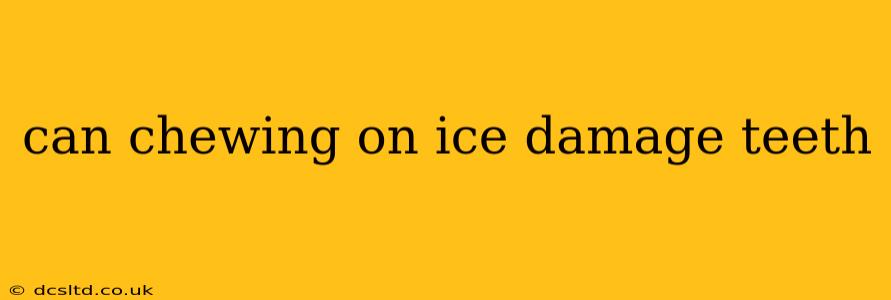Many people enjoy the refreshing crunch of ice, but is this seemingly harmless habit actually damaging your teeth? The short answer is: yes, chewing on ice can significantly damage your teeth. While an occasional small piece might not cause immediate harm, regularly indulging in this habit can lead to a range of dental problems. This article explores the potential consequences and offers advice on breaking the ice-chewing habit.
What Happens When You Chew Ice?
The hardness of ice makes it an abrasive substance. When you chew on ice, the force you apply, combined with the ice's hardness, can lead to:
- Cracked or chipped teeth: The enamel, the hard outer layer of your teeth, is the strongest substance in the human body, but it's not indestructible. Chewing on ice puts immense pressure on your teeth, potentially causing cracks or chips, especially in already weakened or compromised teeth.
- Fractured fillings or crowns: If you have existing dental work like fillings or crowns, chewing ice can dislodge or fracture these restorations. This can lead to further damage to the underlying tooth structure and require costly repairs.
- Worn-down enamel: The constant abrasion from chewing ice gradually wears away the enamel, leaving your teeth vulnerable to decay, sensitivity, and discoloration. This process can be irreversible.
- Increased tooth sensitivity: Once the enamel is eroded, the dentin underneath becomes exposed. Dentin is more sensitive to temperature changes and sweet or acidic foods, leading to discomfort.
How Can I Tell if My Teeth are Damaged from Chewing Ice?
Recognizing the early signs of ice-related tooth damage is crucial for timely intervention. Look out for these symptoms:
- Sudden tooth pain: Sharp, shooting pain, especially when biting down or consuming hot or cold foods/drinks.
- Increased tooth sensitivity: Pain or discomfort when consuming something hot, cold, sweet, or acidic.
- Visible cracks or chips: Inspect your teeth regularly in a mirror for any cracks, chips, or discoloration.
- Loose fillings or crowns: If you have fillings or crowns, check for any looseness or noticeable damage.
What are the Long-Term Effects of Chewing Ice?
The long-term effects of consistently chewing ice can be severe. Untreated damage can lead to:
- Extensive tooth decay: Weakened enamel makes your teeth more susceptible to cavities.
- Need for root canals or extractions: Severe damage may necessitate root canals to save the tooth or, in extreme cases, tooth extraction.
- Costly dental procedures: Repairing ice-induced damage can be expensive.
Is it Harmful to Chew on Ice Cubes Occasionally?
While the occasional small piece of ice probably won't cause significant damage, it's still best to avoid it altogether. The cumulative effect of even seemingly harmless instances of ice chewing over time can lead to substantial dental problems.
How Can I Stop Chewing Ice?
Breaking a habit like ice chewing requires conscious effort and strategy:
- Identify your triggers: What situations or emotions lead you to crave ice? Understanding your triggers is the first step towards overcoming the habit.
- Find healthy alternatives: Satisfy your need for a refreshing crunch with healthier options like carrots, celery, or sugar-free gum.
- Stay hydrated: Often, the urge to chew ice is related to dehydration. Drink plenty of water throughout the day.
- Seek professional help: If you're struggling to break the habit on your own, consider seeking help from a therapist or counselor. They can provide guidance and support.
Can chewing ice lead to other health problems?
While the primary concerns are dental, consistently chewing ice could indirectly contribute to jaw problems due to the repetitive strain. However, the dental ramifications are the most significant and immediate concern.
In conclusion, while the refreshing sensation of chewing ice might be tempting, the potential damage to your teeth far outweighs the benefits. By understanding the risks and implementing strategies to break this habit, you can protect your oral health and enjoy a lifetime of healthy smiles. Remember to consult your dentist regularly for check-ups and professional advice.
